I have barely left the house this week; a complete change in
the weather with dull, grey and yes, even wet days was my excuse but a general insidious
apathy somehow crept back in once again.
I am never quite sure where it comes from but it just sneaks up on me.
It felt a little warmer this morning and I chucked myself
out the front door at 9.30 to have a few hours out. I should really be traipsing around some North
Kent coastal marsh checking distant shimmery waders in my scope but as seems to
be my default at the moment, I was lured back to the Downs.
I had Queendown Warren almost to myself and despite the
cooler air and breeze it felt just warm enough for there to be a few insects on
the wing. The first sheltered section
was actually alive with Meadow Browns and Gatekeepers with a few Whites and
Common Blues thrown in. The Marjoram was
buzzing with Bumbles and Honey Bees and there were a few Eristalis hovers in attendance
including delightful E intricaria.
 |
| Common Blue |
 |
| Meadow Brown |
 |
| Gatekeeper |
 |
| Meadow Brown |
 |
| Eristalis intricaria |
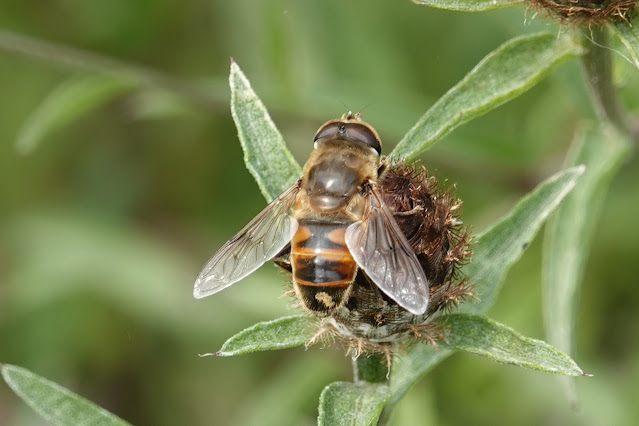 |
| Eristalis tenax |
 |
| Eristalis pertinax |
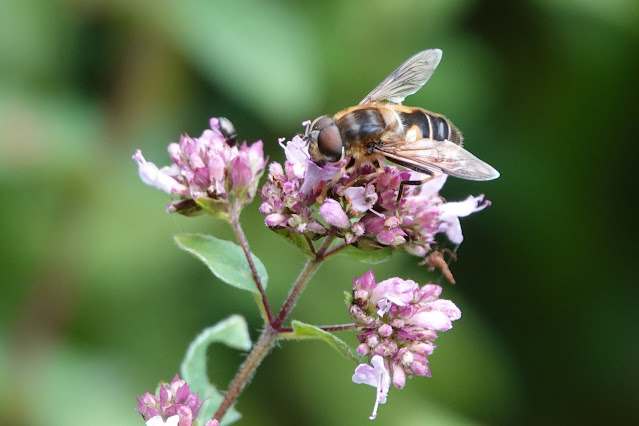 |
| Eristalis pertinax |
 |
| Eristalis intricaria |
 |
| Big long Bombus - wondering if she is a B vestalis? |
Once up on the start of the slope I was pleasantly surprised
to almost immediately discover a freshly emerged Silver Spotted Skipper which
settled for a short while. I wondered if
it was a tad early. Brown Argus and a single Chalkhill Blue were seen and I
kept my eye open for Melitta tricincta as there is plenty of Red Bartsia here
and sure enough I found quite a few weaving in and out at ground level. Because the flowers droop it makes getting a
shot of one very tricky but eventually ne stopped for some ablutions!
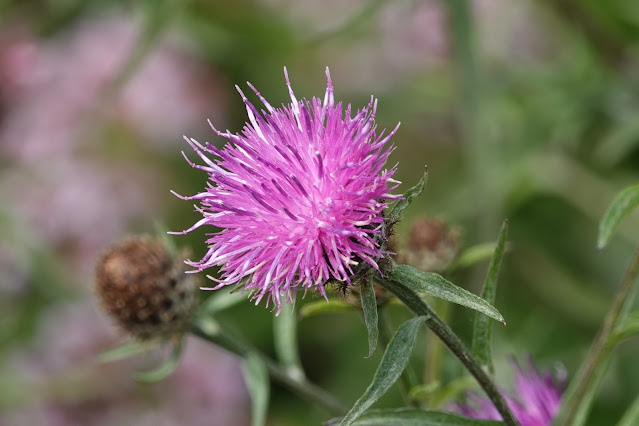 |
| Knapweed |
 |
| Silver Spotted Skipper |
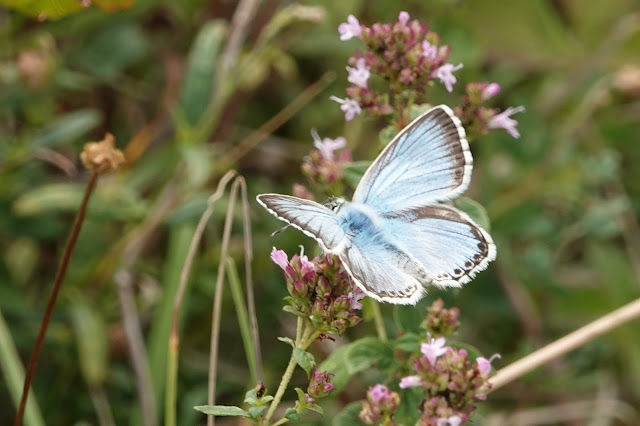 |
| Chalkhill Blue |
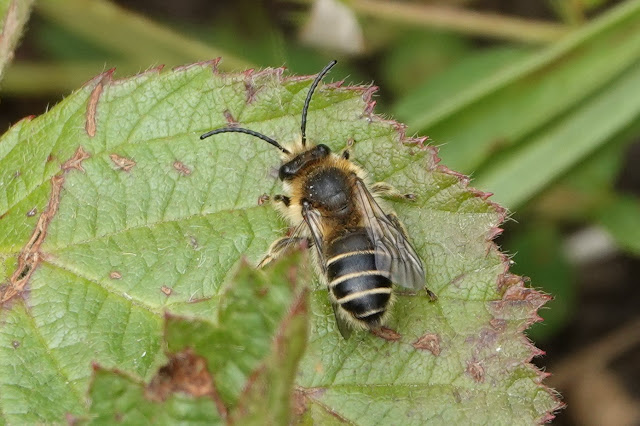 |
| Melitta tricincta |
 |
| Brown Argus |
There were also at least three Andrena hattorfiana on both the
Small and Field Scabious blooms and I do not think I have seen them here
before.
 |
| Andrena hattorfiana |
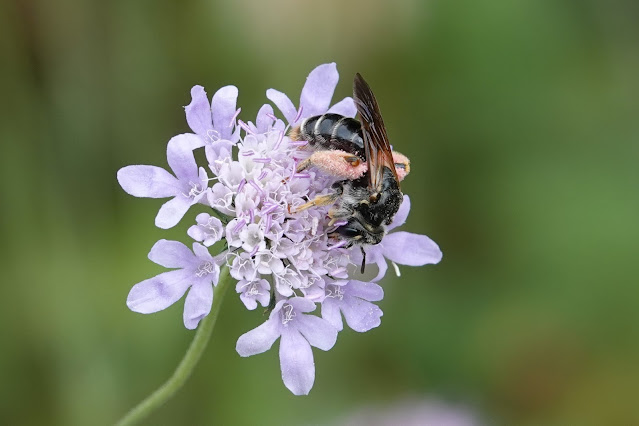 |
| Andrena hattorfiana |
 |
| Andrena hattorfiana |
Rufous, Meadow and Field Grasshoppers were everywhere
although they were not especially noisy but getting a good shot of the Rufous
proved difficult as they kept burrowing into the vegetation!
 |
| Rufous Grasshoppers |
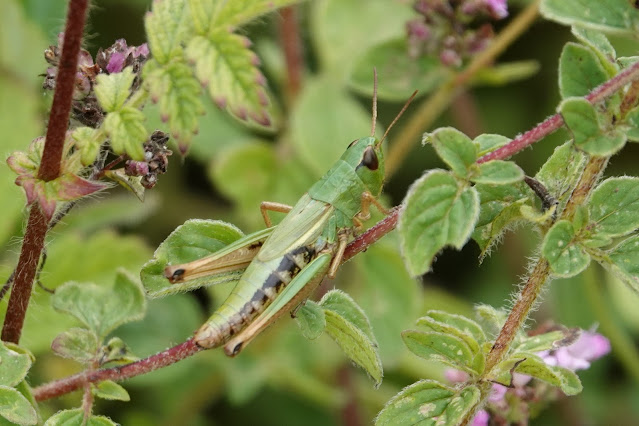 |
| Meadow Grasshoppers |
Four ‘Mint moths’ were seen with Pyrausta aurata being the
commonest with a couple of worn P purpuralis and singles of P despicata and P
nigrata. Oncocera semirubella zipped up
from my feet and a couple were in full on Rhubarb & Custard garb. There were many micros but most were brown
(sorry) and I needed a tame Lepidopterist with me really! I did however id Agapeta zoegana which is
yellow!
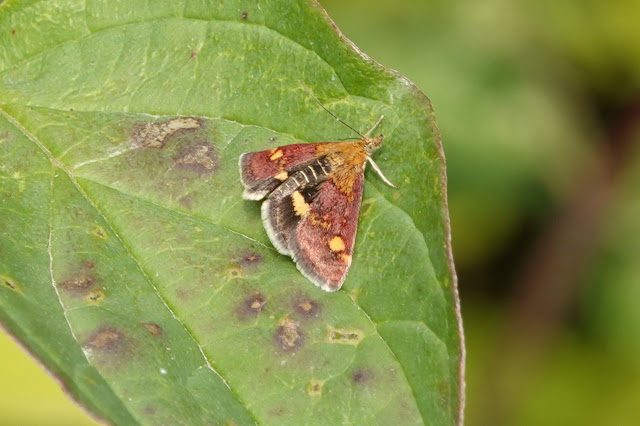 |
| Pyrausta aurata |
 |
| Pyrausta aurata |
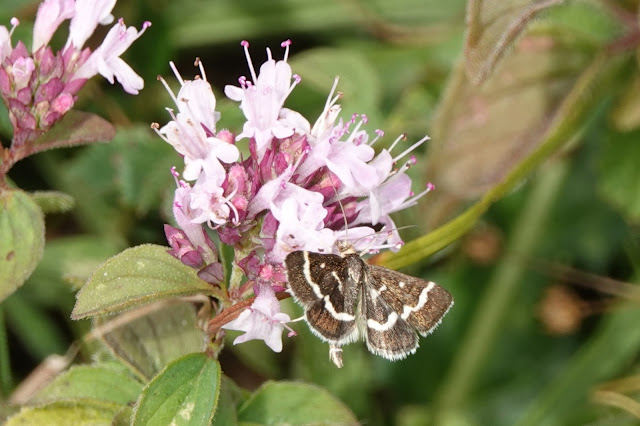 |
| Pyrausta nigrata |
 |
| Pyrausta purpuralis I reckon |
 |
| Agapeta zoegana |
 |
| Oncocera semirubella - I have the R&C thee tune in my head now |
There were a couple of Six Spot Burnet Moths around and I
found a spent cocoon cases too. Meadow
Browns were the commonest butterfly but the slopes were not even remotely alive
with wings and I counted just 11 Chalkhills in total and a single Marbled
White.
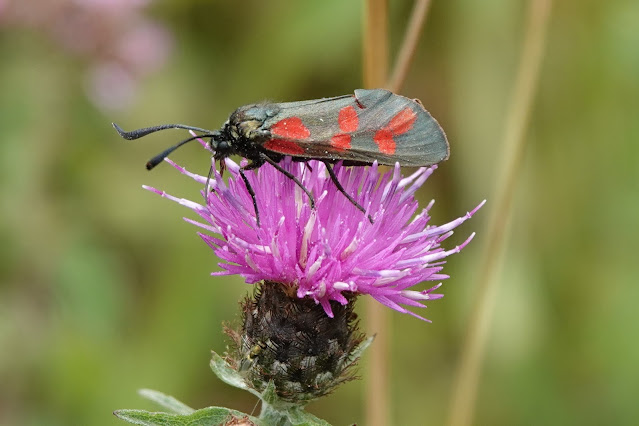 |
| Six Spot Burnet Moth |
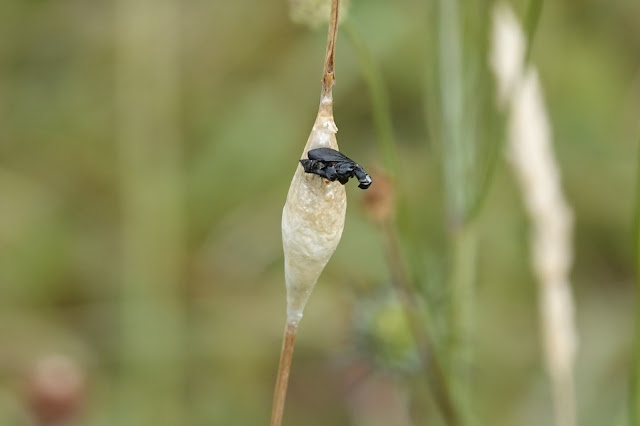 |
| Six Spot Burnet Moth case |
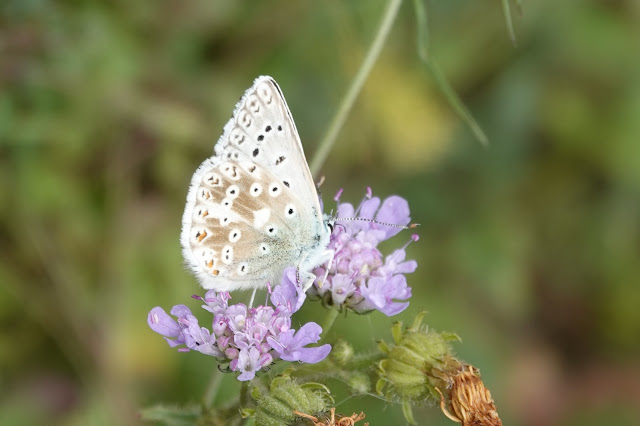 |
| Chalkhill Blue |
 |
| Chalkhill Blue |
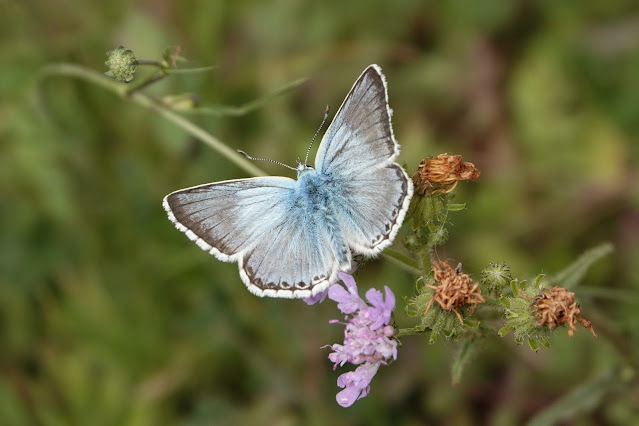 |
| Chalkhill Blue |
 |
| Chalkhill Blue - the only female I saw |
There were no Autumn Ladies Tresses up yet and it was
starting to feel like rain so I turned back.
The local Buzzard family were trying to encourage their young to come
foraging for themselves rather than sitting around in the woods screaming for
attention. There was the odd sortie but they were not really doing as their
parents wanted.
I found another obliging Silver Spotted Skipper on the way
back and risked the Dwarf Thistles for a better shot and at the same spot I
also persuaded a Stripe Winged Grasshopper to stay on the path for a few moments
too. My first Painted Lady since late
June was an immaculate beast as was the only Peacock I saw.
 |
| Dwarf Thistle |
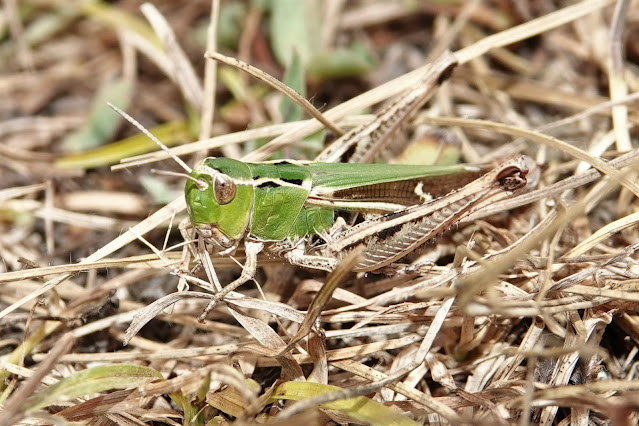 |
| Stripe Winged Grasshopper |
 |
| Painted Lady |
 |
| Painted Lady |
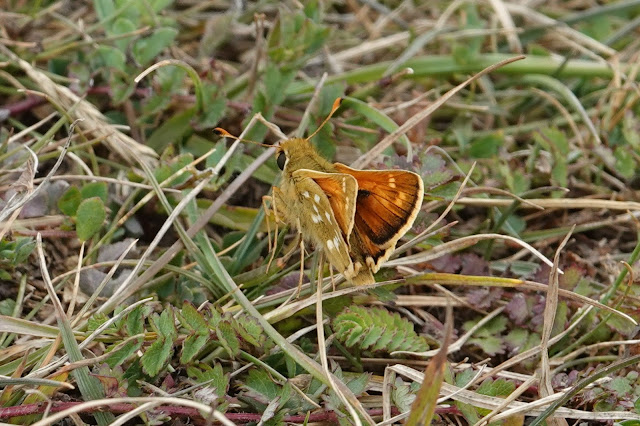 |
| Silver Spotted Skipper |
 |
| Silver Spotted Skipper |
 |
| Silver Spotted Skipper |
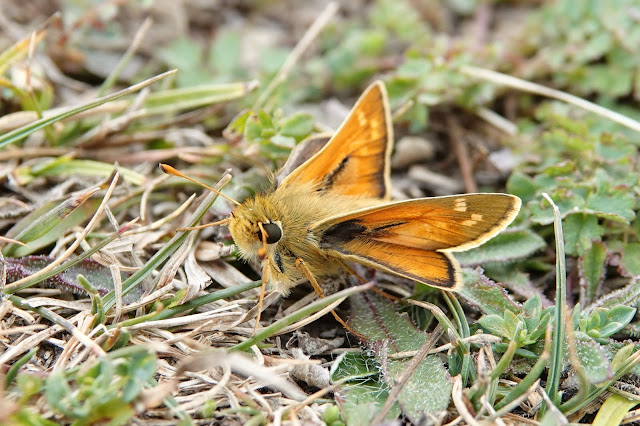 |
| Silver Spotted Skipper - could it be any fluffier? |
A last look at the main Marjoram bed where a Chrysotoxum
festivum posed nicely along with Xylota segnis, Myathropa florea and a Volucella
inanis which seem to be having a good year.
Eriothrix rufomaculata were on the Ragwort and a single Tachina fera was
also seen.
 |
| Eriothrix rufomaculata |
 |
| Chrysotoxum festivum |
 |
| Chrysotoxum festivum |
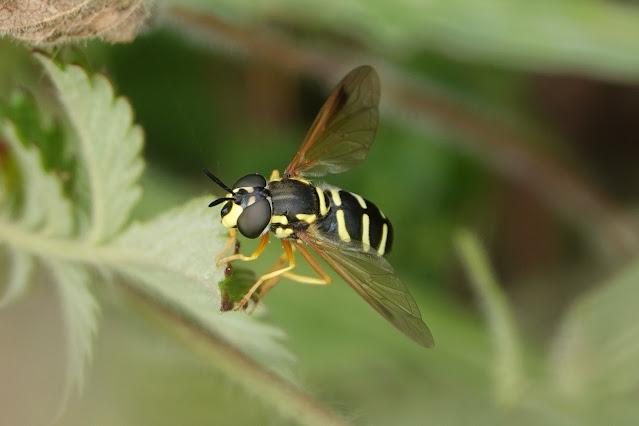 |
| Chrysotoxum festivum |
 |
| Volucella inanis |
 |
| Volucella inanis |
 |
| Xylota segnis |
 |
| Tachina fera |
Kite Tailed Robberflies were on the prowl and a solitary Bee
tweaked a memory cell and I think it is Halictus rubicundus. A Comma was my last
Butterfly for the site and the small Buddleia held only one insect and that was
a rather splendid Jersey Tiger.
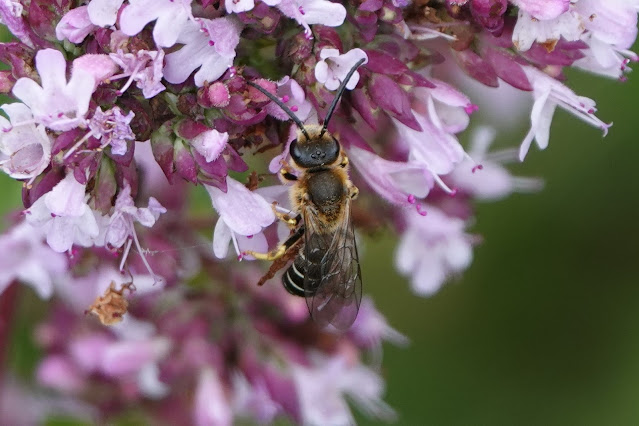 |
| Halictus rubicundus |
 |
| Comma |
 |
| Ploughman's Spikenard |
 |
| Perennial Sow Thistle |
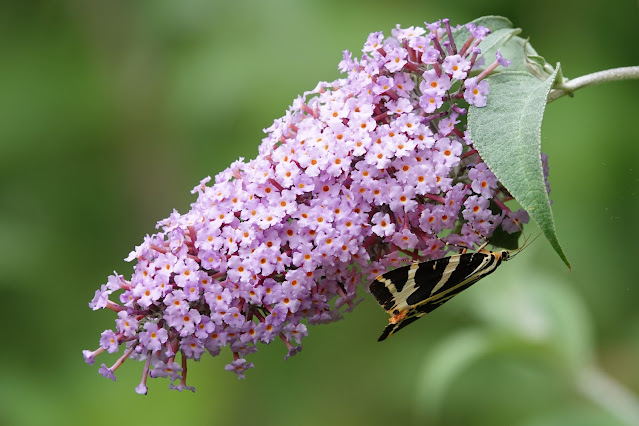 |
| Jersey Tiger |
From here I drove through the grey to Detling and The
Larches where in theory the low light would not disrupt my potential botanising. I was soon crouching down to get up close to
the Yellow Bird’s Nest that were poking through the Beech leaflitter. Only the ones with the Yew understorey were
in good nick. Those out just under the
Beech Trees were pretty crispy and I suspect will not come to much fruition
this year.
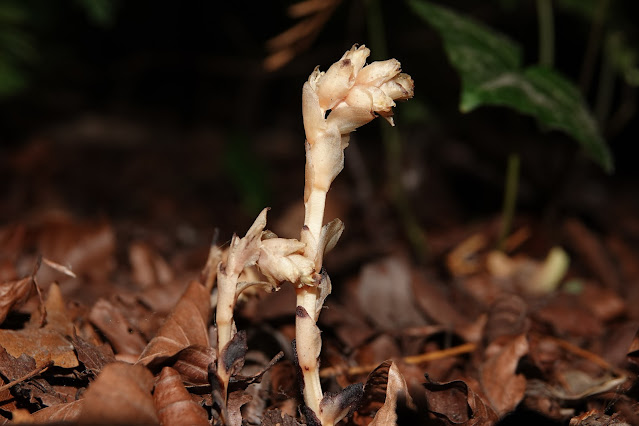 |
| Yellow Bird’s Nest |
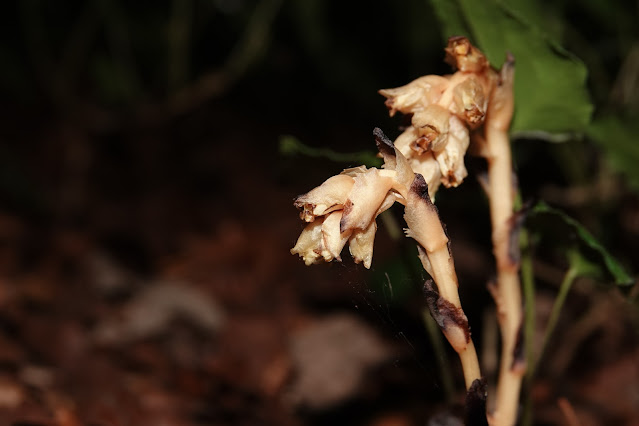 |
| Yellow Bird’s Nest |
 |
| Yellow Bird’s Nest |
I could hear the Ravens above me and four scrappy looking
birds spent my entire visit barrelling back and forth across the valley demonstrating
their full vocal range. The Broad-leaved Helleborines had managed not to get
scorched and I counted 69 flowering spires alongside the path in a bewildering
array of colour and spire configurations.
Some were loosely spaced and others tightly packed and ranged from plain
deep Burgundy through to pale pink and green.
Wasps (Norwegian I think but I have asked for help) were visiting the
flowers and one had a heap of pollinia stuck
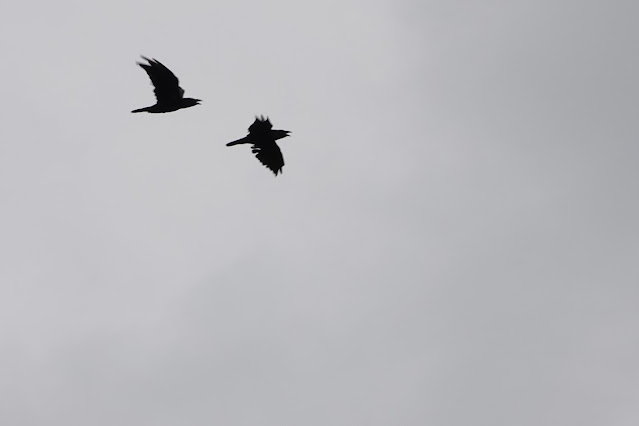 |
| Ravens |
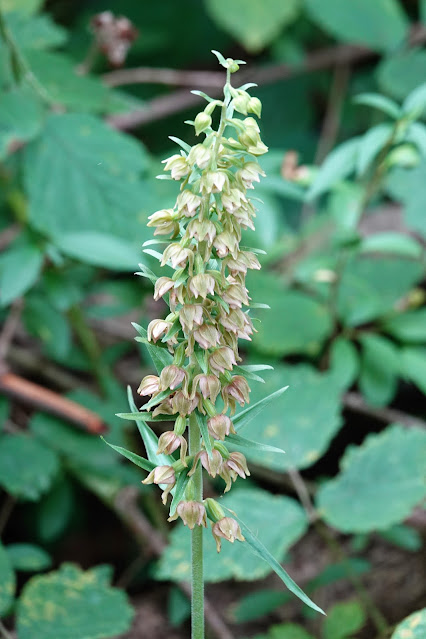 |
| All the above are Broad-leaved Helleborines |
The meadow has been grazed and then cleared to the ground
and was actually devoid of any life whatsoever so I retraced my steps and spent
some time I the path verge where a Rufous Grasshopper appeared on my leg and a Dark
Bush Cricket in the middle of the path.
A female Long-winged Conehead was still not fully mature (no wings) but
had the diagnostic sabre for an ovipositor.
 |
| Dark Bush Cricket |
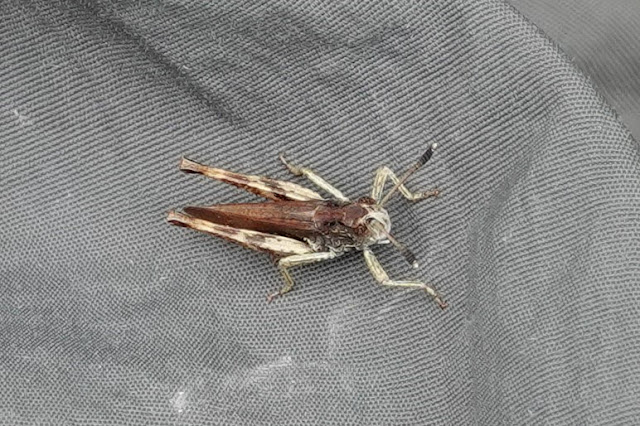 |
| Rufous Grasshopper |
 |
| Long-winged Conehead |
 |
Buff Footman
|
 |
| Pyrausta aurata |
 |
| Pyrausta aurata |
A Speckled Wood was the only butterfly I saw here and a
Xanthogramma frustrated me as I could see the collection of yellow spots on the
side that would help point to X stacklebergi but I could not get a pic but imho
the upperpart short that I got feels good with restricted dark wing patches and
very narrow body stripes but hey ho.
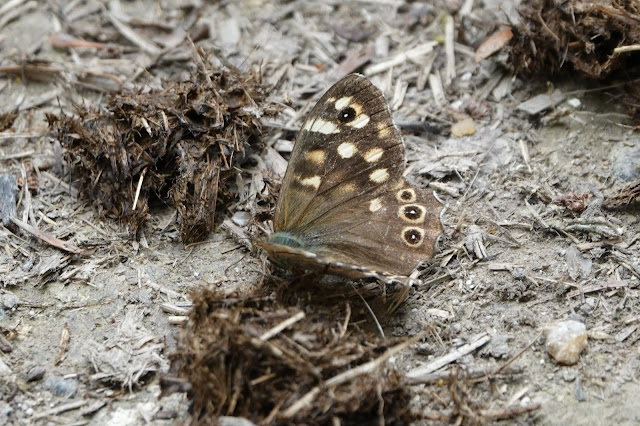 |
| Speckled Wood |
 |
| Xanthogramma - I think it may be stacklebergi |
But just a few feet away a Conopid flitted up in front and I
was distracted from my Hoverfly frustration - Physocephala rufipes. Any Conopid that is not Sicus ferrugineus is
always a bonus!
 |
| Physocephala rufipes. |
From here I cut back to the west side of the Medway to go
and have a look for Violet Helleborines between Snodland and Vigo. It was very dark in the woods but it was
worth the walk as I found quite a few fine flower spires including one that
seemed to lack almost any pigment other than greens but it could have been the
light.
Like at The Larches several Wasps were attending the flowers but I was surprised to also see several Baccha elongata Hoverflies also disappearing into the individual flowers although being so slim that were not connecting with the dangling pollen sacs and just got a free drink.
 |
| With Baccha elongata in attendance |
 |
| All Violet helleborines - last couple with flash |
 |
| Wasp with pollinia on its head |
The meadow just outside the wood was looking fabulous with
huge tall skinny Thistles (sorry Enid!).
There were a few Meadow Browns and Gatekeepers and a lone Chalkhill Blue
was a surprise while a female Silver Washed Fritillary was seen on an
unapproachable Buddleia.
 |
| Eriothrix rufomaculata |
 |
| Silver Washed Fritillary at about 80 yards! |
Field, Meadow and Rufous Grasshoppers were here too as well
as my first Speckled Bush Cricket of the day and three more Six Spot Burnets.
 |
| Meadow Grasshopper |
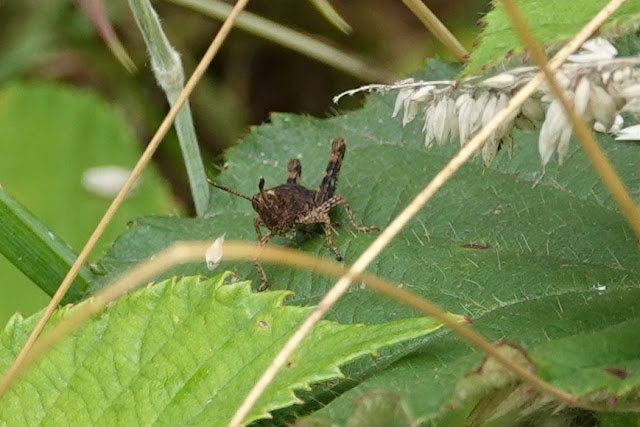 |
| Reckon this is an immature Rufous Grasshopper |
 |
| Field Grasshopper |
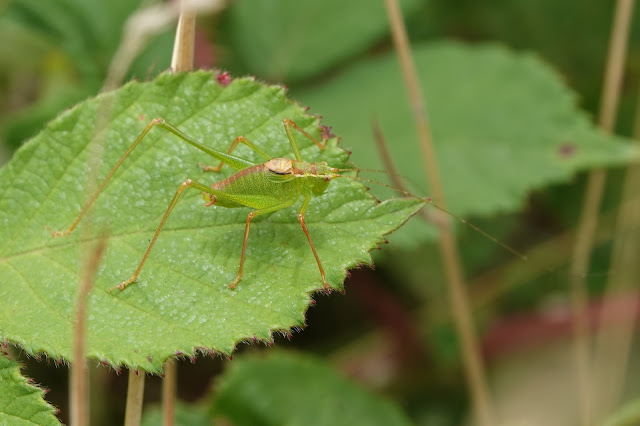 |
| Speckled Bush Cricket |
I called it a day at this point and wended my way back
through the lanes towards Great Buckland and Luddesdown. It is a lost world down there of tiny roads,
blind corners, odd big farm houses, others that look like they have been made
out of pallets with skewwhiff windows, horses of every size and more fledgling vineyards
than I ever imagined with regimented lines of bright green vine guards
stretching into the distance across otherwise barren ground.















































































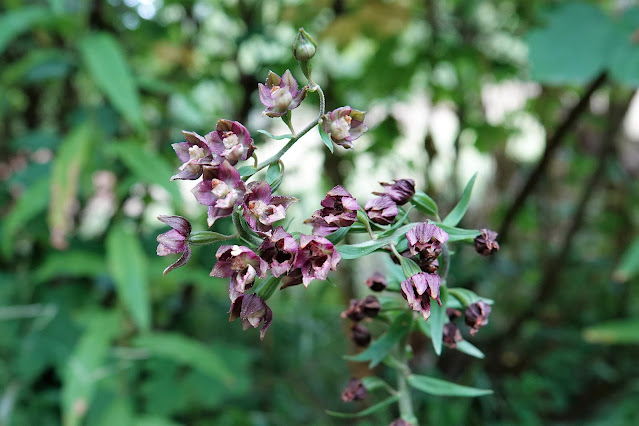





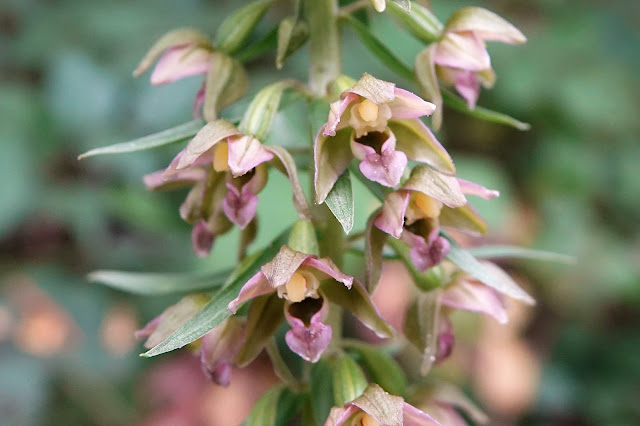

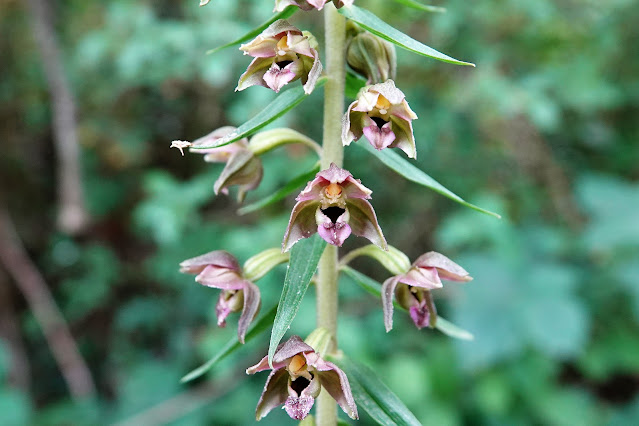






what an amazing collection of pictures, thank you very much indeed , that are really interesting to a novice like me.
ReplyDelete